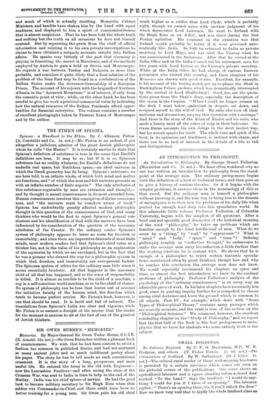AN INTRODUCTION TO PHILOSOPHY.
An Introduction to Philosophy. By George Stuart Fullerton. (Macmillan and Co. 7s. net.)—We have often wondered why no one has written an introduction to philosophy from the stand- point of the average man. The ordinary prolegomena begins with the definition of a host of technical terms, and then goes on to give a history of various theories. Or if it begins with the simpler problems, it answers them in the terminology of this or that creed. But the ordinary man is himself a philosopher without knowing it, and the true way to bring him to the domain of metaphysics is to show how the problems of his daily life when pushed far enough lead deep into this speculative world. In this admirable little volume Professor Fullerton, of Columbia University, begins with the simplest of all questions. After a brief and not specially good discussion of the historical meaning of the word "philosophy," he takes up problems which are familiar enough to the least intellectual of men. What do we mean by a "thing," by "real," by " appearance" ? What is " mind " and " body," " space " and " time " ? Defining philosophy roughly as "reflective thought," he endeavours to make the average man carry his reflection a little further than the working solutions he is content with. He shows that he is enough of a philosopher to reject certain fantastic specula- tions, maintained often by great thinkers, though how and why he reaches this conclusion the average man does not know. We would especially recommend his chapters on space and time, as almost the best introduction we know to the cardinal problems of philosophy. Professor Fullerton's analysis of the psychology of the "ordinary consciousness" is in every way an admirable piece of work. In his later chapters he is necessarily less good, since in pushing inquiry further ho is compelled to choose among rival doctrines and leave the ground which is common to all schools. Part IV., for example, which deals with " Some Types of Philosophical Theory," contains many passages which are scarcely accurate, and the same is true of the section on the " Philosophical Sciences." We commend, however, the excellent concluding chapter on the "Study of Philosophy," and we repeat that the first half of the book is the best prolegomena to meta- physics that we know for students who come entirely fresh to the subject.






























































 Previous page
Previous page